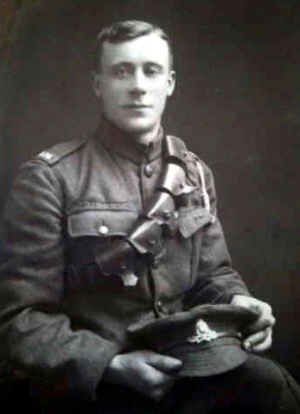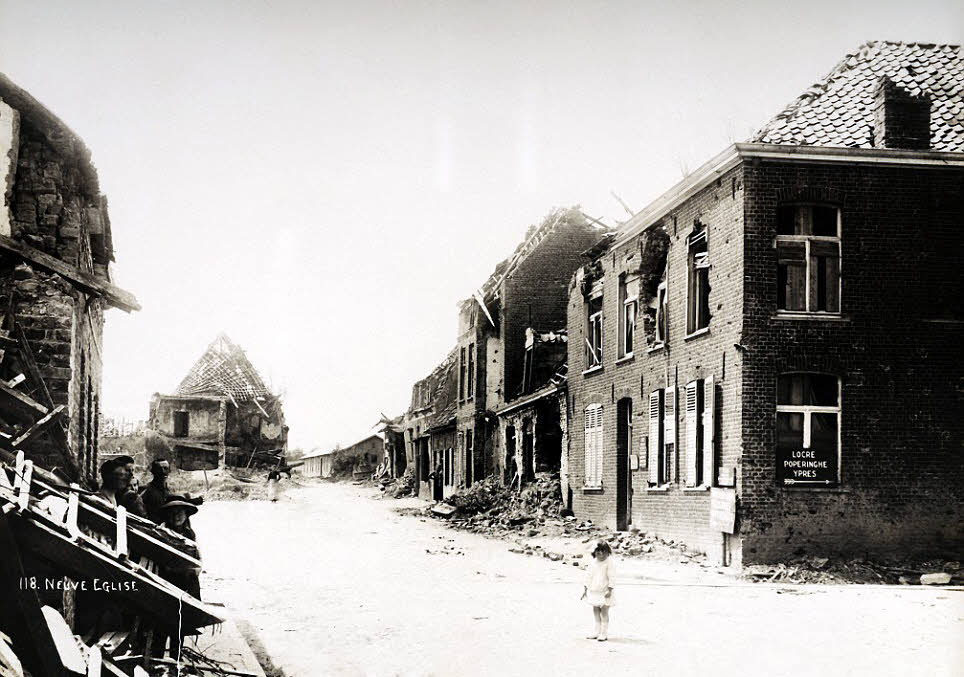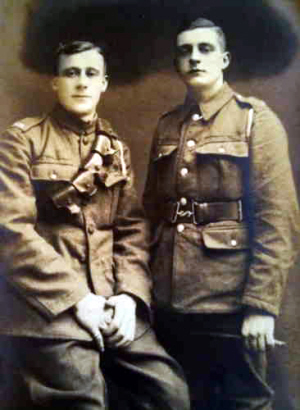Gunner James Preston, 186927, Royal Field Artillery, “D” Battery, 11th Brigade
 James Lockwood Preston was born in Ossett on the 13th November 1887 the third born child and second son of seven children born to Julius Mortimer Preston and Sarah Jane Lockwood. Two of the children, both boys, died before 1911. Julius, of Armley, Leeds and Ossett born Sarah Jane married at South Ossett Christ Church on the 6th November 1880 and began their married life in their new home on Albert Street, Ossett. James and his older sister, Gertrude were baptised at South Ossett Christ Church on the 4th October 1890. Gertrude was born in Aix-La-Chappel, Germany. The family moved to Back Lane, Ossett in the late 1880s/ early 1890s and in 1891 they are recorded living next door to Sarah Jane’s parents, John Lockwood and his second wife, Emma.
James Lockwood Preston was born in Ossett on the 13th November 1887 the third born child and second son of seven children born to Julius Mortimer Preston and Sarah Jane Lockwood. Two of the children, both boys, died before 1911. Julius, of Armley, Leeds and Ossett born Sarah Jane married at South Ossett Christ Church on the 6th November 1880 and began their married life in their new home on Albert Street, Ossett. James and his older sister, Gertrude were baptised at South Ossett Christ Church on the 4th October 1890. Gertrude was born in Aix-La-Chappel, Germany. The family moved to Back Lane, Ossett in the late 1880s/ early 1890s and in 1891 they are recorded living next door to Sarah Jane’s parents, John Lockwood and his second wife, Emma.
In the late 1890s the family relocated to Batley where, in 1901 James, aged 13, worked as a butcher’s boy. In 1911 James, aged 23, was working as a butcher’s journeyman and living with his parents and four surviving siblings at Commercial Street Batley.
James Preston’s army service record has not survived but it is known that he enlisted at Woolwich and first served with the Royal Veterinary Corps (service number SE /15156) before being transferred to “D” Battery, 11th Brigade of the Royal Field Artillery (service number 186927.)
The Royal Veterinary Corps was responsible for the medical care of animals used by the army; predominantly horses, mules and pigeons. During the War the Corps reorganised to provide a Mobile Veterinary Section as part of each Division that went overseas. In the main each went overseas with the rest of its division.
At some stage James was transferred to the 11th Brigade of The Royal Field Artillery (RFA) which was the most numerous arm of the artillery, the horse-drawn RFA was responsible for the medium calibre guns and howitzers deployed close to the front line and was reasonably mobile. It was organised into brigades.
Shortly after the outbreak of WW1 the 11th Brigade, Royal Field Artillery came under the command of the 7th (Meerut) Division of the Indian Army and moved to the 3rd (Lahore) Division on the 22nd November 1914. When the Division left France, the brigade remained and eventually came under command of the 3rd Canadian Division before going to the 4th Canadian Division in October 1916, with which it served until August 1917. At that point it became an Army Brigade and served with the Fourth Army in August 1917, Fifth Army in November 1917, Fourth Army again in December 1917 and the Second Army in February 1918. 11 Brigade RFA was attached to XIX Corps from the 29th October to the 7th November 1917 and was then withdrawn to rest. It returned to XIX Corps on the 2nd December until the 3rd January 1918, and after a further period of rest it was attached to II Corps on the 3rd February until the 30th March 1918, then to the Australian Corps until the 5th April, when it was attached to IX Corps until the 19th April 1918.
Since James served overseas in France and Belgium by April 1916, it is likely that he saw action with the two Canadian Divisions and the British Fourth, Fifth and Second Armies. As such it is likely that he will have seen action in several of the battles of the Somme in 1916 and the Arras Offensive in 1917. By February 1918 James Preston’s 11th Brigade RFA was serving under the command of the Second Army which had spent most of the War fighting at Ypres and it was to be here that Gunner James Preston was to lose his life.
In mid-February 1918, 81 German divisions faced Douglas Haig's 59, and for the first time in three years the British had to prepare to face a major attack. Haig could not afford to give ground near to the Channel coast so the northern sector of his front was most heavily defended while further south his forces were more thinly spread. General Plumer's Second Army around Ypres had to hold 37 kilometres (23 miles) of line with 14 divisions. During the massive operation of the 1918 German Spring Offensive ("Operation Georgette" at Ypres) which began in late March 1918 the German Army advanced to within a few kilometres east of Ypres, but was still not successful in capturing it. Their objective was to push the British forces back to the channel ports and out of the War.
At the time of his death Gunner James Preston was serving with the 11th Brigade RFA under the command of the Australian Corps attached to IX Corps. On the day of James’s death, 13th April 1918, the German forces were pushing on to the important centre of Hazebrouck, south of Ypres, but were stopped by the Australian 1st Division in what became known as the Battle of Hazebrouck.
James Lockwood Preston was killed in action on the 13th April 1918 most probably in this battle which was one of several which became known as the Battle of the Lys, the Lys Offensive or the Fourth Battle of Ypres. He was 30 years of age.

Above: The town of Neuve Eglise near Ypres. This area bore the brunt of fighting in April 1918.
The following report is reproduced from the local newspaper and was published shortly after his death 2.
"Although he sent a field card on April 13th to say he was keeping quite well, Gunner James Lockwood Preston (30) R.F.A., son of Mr. and Mrs. J. M. Preston, 106, Commercial Street, Batley, is now officially stated as being killed on that date. He attended Batley Parish Church School and afterwards was apprenticed to Mr. Atkinson, Butcher of Upper Commercial Street. Later he entered Dewsbury Co-op butchering department and at the time of enlisting was employed by the Rotherham Society. He had been in France two years. A younger brother, Pte. Arthur Preston (19) has been in France for a month with the Yorkshires. No news has been received from him during the last three weeks."
Gunner James L. Preston, the son of Julius Mortimer Preston and Sarah Jane Preston, of 106, Commercial St., Batley, Yorks, died aged 30 years, on the 13th April 1918, during the German Spring Offensive at Ypres. He was posthumously awarded the British and Victory Medals but not the 1914/15 Star indicating that he did not serve overseas on or before 31st December 1915. He is remembered at home on the Batley Parish and the Batley War Memorials and overseas on Panel 1 of the Ploegsteert Memorial3 which stands in Berks Cemetery Extension, which is located 12.5 Kms south of Ypres town centre.
The Ploegsteert Memorial commemorates more than 11,000 servicemen of the United Kingdom and South African forces who died in this sector during the First World War and have no known grave. The memorial serves the area from the line Caestre-Dranoutre-Warneton to the north, to Haverskerque-Estaires-Fournes to the south, including the towns of Hazebrouck, Merville, Bailleul and Armentieres, the Forest of Nieppe, and Ploegsteert Wood.
Most of those commemorated by the memorial did not die in major offensives, such as those which took place around Ypres to the north, or Loos to the south. Most were killed in the course of the day-to-day trench warfare which characterised this part of the line, or in small scale set engagements, usually carried out in support of the major attacks taking place elsewhere.
 There was better news of Arthur Preston who is also mentioned in the "Batley News" article of the day. His Army Service record has survived and whilst in poor condition and barely legible in places it reveals that Arthur was posted missing on the 11th April 1918, just two days before the death of his only surviving elder brother. The service record also bears the word "repatriation" suggesting that Arthur may have been captured and spent the rest of the War as a Prisoner-of-War. Arthur, who was born in Batley and appears not to have lived in Ossett, was finally demobilised from the Army in October 1919.
There was better news of Arthur Preston who is also mentioned in the "Batley News" article of the day. His Army Service record has survived and whilst in poor condition and barely legible in places it reveals that Arthur was posted missing on the 11th April 1918, just two days before the death of his only surviving elder brother. The service record also bears the word "repatriation" suggesting that Arthur may have been captured and spent the rest of the War as a Prisoner-of-War. Arthur, who was born in Batley and appears not to have lived in Ossett, was finally demobilised from the Army in October 1919.
James Lockwood Preston was the son of Julius Mortimer Preston and Sarah Jane Lockwood. Sarah Jane was the daughter of Ossett joiner John Lockwood whose brother, Mark Lockwood, also a joiner, was the father of Joshua Lockwood who died in army service in December 1918. A year earlier Mark Lockwood also lost a grandson in WW1 , Stanley Lockwood, who died from wounds in December 1917.
The Great War was particularly cruel to Sarah Jane Preston (nee Lockwood) who lost a son, a cousin and a nephew. She also suffered the grief of not knowing the whereabouts of a second son, Arthur, missing in action at the time of the death of her eldest surviving son, James. Life had not been easy for Sarah Jane who had also lost another two sons before 1911.
Left: Brothers James L. Preston and Arthur Preston
James Lockwood Preston is not remembered on any Ossett Memorial or Roll of Honour, most probably because he and his family left Ossett in the late 1890s. He is however remembered in this 2014 biography and Roll of Honour because, in common with other men so honoured, he was born and lived in Ossett. Moreover, even though his parents left Ossett to make their living elsewhere they never forgot Ossett. James Preston’s father, Julius Mortimer Preston, was buried at Ossett Holy Trinity Church on the 19th December 1922 and his mother, Sarah Jane Preston, nee Lockwood, died in Stratford upon Avon in late December 1940 and was buried at Ossett Holy Trinity Church on the 3rd January 1940.
References:
2. "Batley News", 27th April 1918